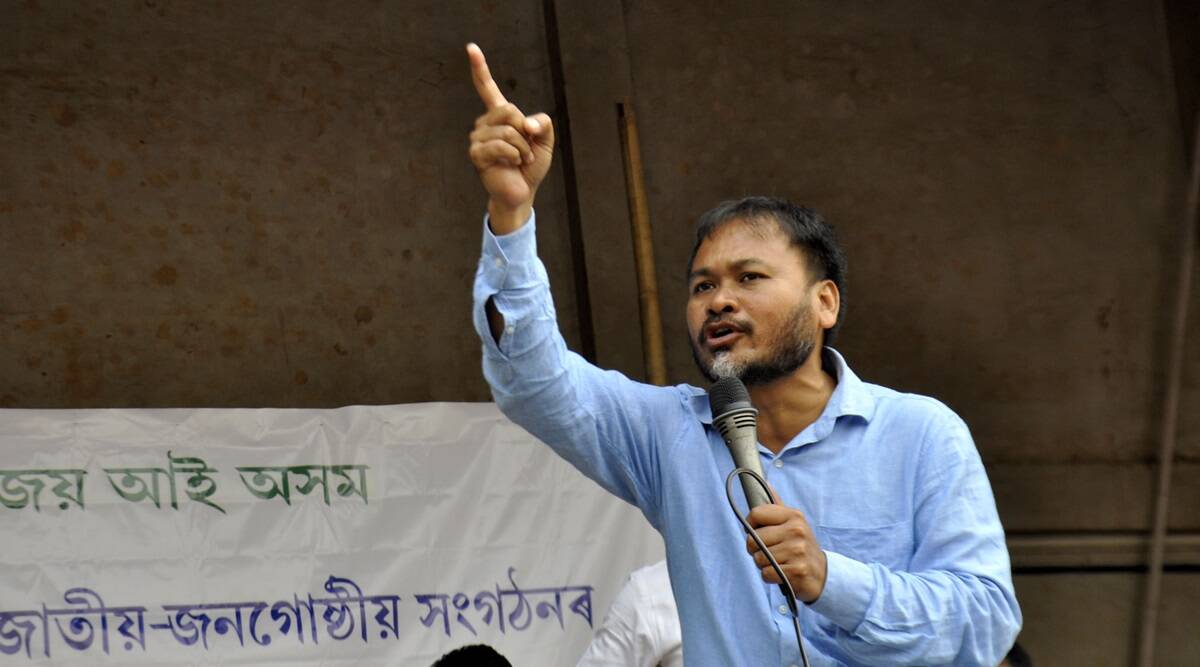 Akhil Gogoi (file photo)
Akhil Gogoi (file photo) Dismissing an appeal by the National Investigation Agency (NIA), the Gauhati High Court upheld a special NIA court order that had in October granted bail to activist Akhil Gogoi in connection to his alleged role in the 2019 Citizenship (Amendment) Act (CAA) violence in Assam. The court ruled that while even provocative speech may come under the ambit of the Unlawful Activities (Prevention) Act (UAPA), it is only punishable if it is done with the intention of a “terrorist act” aimed at disturbing the country’s “unity, integrity, security and sovereignty.”
It said that there was no ground to hold Gogoi “prima facie guilty of committing a terrorist act.”
While this clears Gogoi in one NIA case (based on a case (289/2019) registered at the Chabua police station in Dibrugarh district), the activist is still in jail under another UAPA case being investigated by the central agency.
Upholding the NIA special court order in connection to the Chabua case on April 9, a bench comprising Justice Suman Shyam and Mir Alfaz Ali observed: “The dominant intention of the wrong doer must be to commit a ‘terrorist act’ coming within the ambit of section 15(1) of the Act. In other words, unless the act complained of strictly comes within the letter and spirit of section 2(1)(o) read with section 15(1) of the Act, the provisions of the Act of 1967 would not be applicable. What ,therefore, follows is that unlawful act of any other nature, including acts arson and violence aimed at creating civil disturbance and law and order problems, which may be punishable under the ordinary law , would not come within the purview of section 15(1) of the Act of 1976 unless it is committed with the requisite intention.” the order stated.
It added: “…an unlawful activity under section 2(1)(o) of the Act of 1967 could even be spoken words including a provocative speeches but in order to constitute an offence under the Act of 1967 the same must be done with the intention to cause death of , or injuries to any person or persons, or to cause loss of or damage to or destruction of any property aimed at disturbing the unity, integrity, security and sovereignty of the country.”
The allegations against Gogoi in Chabua said that he had led a crowd of about 600 people, which caused “economic blockade”, “pelting of stones” and murder of a “police personnel on duty.” Gogoi’s advocate Santanu Borthakur said that the case, which was filed at the Chabua police station, was later taken over by the NIA.
The bench held that while the speech may have been responsible for the violence but “as such, it was held that there was no reasonable ground for holding that the accused respondent (A-1) was prima facie guilty of committing a terrorist act within the meaning of Section 15 of the Act of 1967 which is punishable under Section 16 of the said Act and accordingly, allowed the respondent to go on bail.”
The other NIA case, filed under the Chandmari Police Station that has booked Gogoi under various charges including Sections 120B, 124A, 153B IPC and Sections 18 and 39 of the UA(P) Act, remains, Borthakur said. “The bail plea was rejected by the Gauhati High Court in January and later, by the Supreme Court in February,” he added.
Gogoi was first arrested on December 12, 2020 in Jorhat following an anti-CAA rally. His case was shifted to the NIA two days later and he was booked on charges of sedition and under provisions of the UAP(A) for allegedly being an overground worker of the banned CPI (Maoist).
Several cases were filed against Gogoi across police stations in Assam following the violence— out of which two (Chandmari and Chabua) were taken over by the NIA. Borthakur added that Gogoi had got bail in nine cases including three in Chabua; one each in Sibsagar, Dibrugarh, Gaurisagar, Teok, Jorhat and the recent NIA one which was upheld by the Gauhati HC.
Gogoi contested from the Sibsagar seat in the recently-concluded Assam Assembly elections while in jail. He had floated a new political party, Raijor Dal, late last year.
- The Indian Express website has been rated GREEN for its credibility and trustworthiness by Newsguard, a global service that rates news sources for their journalistic standards.

